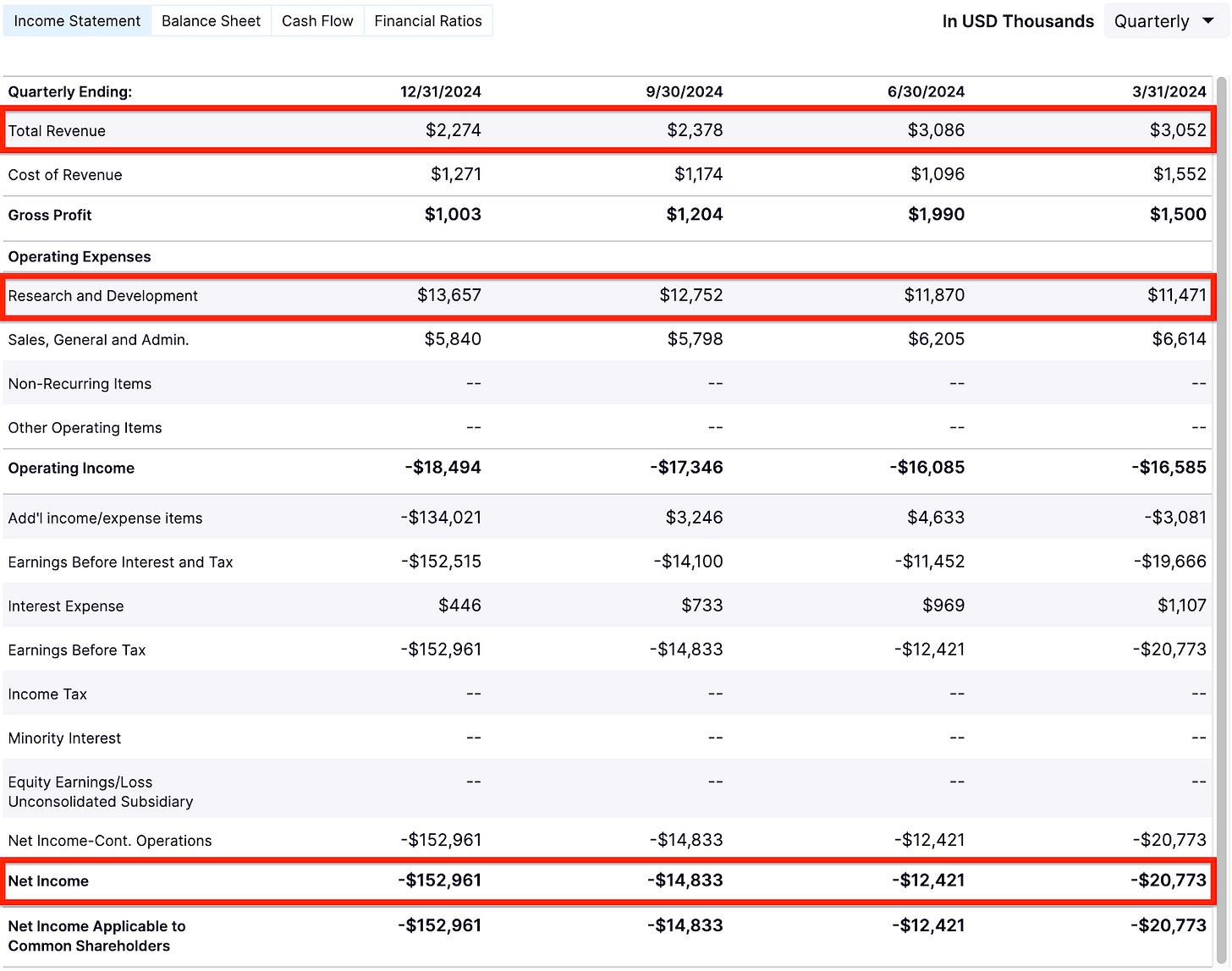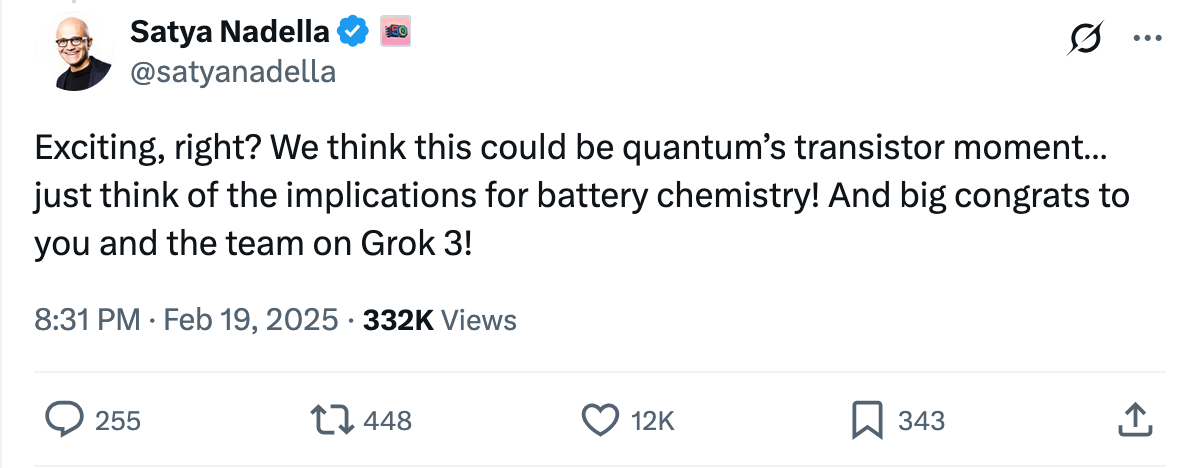Microsoft Just Spiced Up the Quantum Computing Race (but Don’t Rush to Invest Yet)
Wait until it’s clear who the most likely winner is

Let’s have a trillion-dollar conversation.
Technological breakthroughs come from research. Research institutions like the one I work for provide a theoretical and experimental base for game-changing ideas. But the cost of making them mass market is huge.
I’ve worked in academia for eighteen years, and I’m seeing huge changes now. Before you could simply follow your curiosity, run experiments, and discover something new. That’s fundamental science, and it’s not always useful.
The cost of resources has gone up since the pandemic. Electricity prices have risen. Many physics labs can’t afford to pay for the liquid nitrogen or helium used to cool samples down. And we run more sophisticated experiments every year.
All this requires more money.
Governments can’t give billions of dollars of taxpayers’ dollars to every research institution. Academia is attracting third-party funding by partnering with industry. A shift from fundamental to applied science is happening.
Quantum computing is the wildest case out there.
Microsoft is doing its best to monetize its research in quantum computing. Public research can help push this concept forward but giants like Microsoft will probably pay the insane bill to make it real.
It’s 100% worth it. McKinsey says quantum computing will create value worth trillions of dollars.
Microsoft seems to be a forerunner in this space. But is it, really?
It’s easy to mess up quantum computers
Quantum mechanics can make you go nuts.
Take a particle like an electron. You can’t measure its position and velocity at the same time with perfect precision. If you measure its position, you’ll mess up its velocity because your measurement will interfere with the electron and change its state in the process.
So before you run the measurement, the electron’s state is undefined. It’s like it’s in multiple states simultaneously. That’s the foundation of qubits that quantum computers use instead of bits.
Classical computers use 0s and 1s. Each state is defined.
But individual qubits can be both 0 and 1 at the same time. That’s a lot of different states in your quantum computer which has a lot of qubits. And qubits can link up and act as a team.
It’s this teamwork that allows them to solve complex tasks quickly. It’s like reading every page of a book in parallel instead of from cover to cover.
Qubits’ processing speed is enormous.
The problem with qubits is they’re sensitive to their surroundings. Their quantum states get wrecked by disturbances like heat, vibrations, and even tiny electromagnetic fields. Qubits collapse to either 0s or 1s and lose their quantum properties.
Quantum computers need shielding from stray fields and ultra-cold temperatures like the boiling point of liquid helium (-269 degrees Celsius) to remove thermal noise.
Microsoft is trying to build qubit protection directly into its hardware. The company’s new chip design sent shockwaves across the scientific community.
The idea is to force electrons inside ultrathin wires. The wires should be superconducting, which means their resistance is zero. Electrons form pairs in this state.
Microsoft wants to accommodate an extra electron in the wires. The wires’ 0 and 1 states correspond to an even (two) and odd (three) number of electrons.
The challenge is reading out the states of the wires. Microsoft said it created a device that can do that.
Elon congratulated the Microsoft team. Microsoft CEO replied:
Mr. Nadella alludes to the creation of the transistor, a simple device that revolutionized electronics. A similar breakthrough in quantum computing could lead to technologies that will make your iPhone seem like a floppy disk from the 1980s.
But a number of researchers say Microsoft made an overblown claim. The company’s work involved changing the range over which different parameters were measured and its experiment and theory imposed different limits on those parameters (to better fit the desired result).
Researchers at Microsoft naturally responded to the backlash with counter-arguments. So far both sides are making confident claims. The debate is far from over.
For you as an investor it means the opportunity is there. But don’t jump in just yet.
Wait for improving fundamentals first
Quantum computers are still in the Research and Development (R&D) phase.
Nvidia CEO said in January
“Very useful quantum computers are decades away.”
He was aware of Microsoft’s possible breakthrough. The company had already published a research paper in 2023 on what they were doing.
And Microsoft is not the only player in the quantum computing space. The industry is getting crowded due to the enormous potential of the technology.
D-Wave Quantum, IonQ, Quantum Computing, and Rigetti Computing provide hardware and software solutions for quantum computing. They’re all public companies, and their stocks are insanely volatile.
Yes, they’ve surged over the past few months. Was that on fundamentals or expectations?
All of them are burning money, have tiny inconsistent revenues and significant debt, and invest in R&D like crazy. Here are the financials of Rigetti Computing:

They’re also tiny companies with market caps of less than $5 billion. If they were doing something revolutionary that Microsoft couldn’t do, we’d probably hear about mergers and acquisitions that involve this bellwether.
Quantum computing has enormous potential. A bloodbath lies ahead of those tiny companies. Maybe some of them will survive. If they do, which one will take the lead?
At this point I’m only seeing their stocks getting speculated. It harms public companies. They surge and spend years in downtrends like GameStop.
You should keep an eye on quantum computing. Microsoft’s $70+ billion cash pile could make it a contender to crack the first mass-market quantum machine alongside the two other giants, Google and IBM.
But the product isn’t there yet. We only have lab toys that kind of work. And even they get skepticism.
Mr. Huang is right we’re far away from the first device a client can purchase.
Giant corporations like Microsoft have limitations. They’re like massive ships. One wrong turn and they can’t swing back fast.
Just think of the sixteen years (2000-16) Microsoft stock went nowhere due to lack of innovation. The company finally reinvented when the new CEO rolled the dice on cloud computing with Azure.
Now Microsoft needs to reinvent again. Quantum computing is its bet.
But don’t discard those tiny companies. They can change course quickly. If they get their finances right, hire innovative people, and patent their findings, they can grow exponentially.
Tell me in the comments which - D-Wave Quantum, IonQ, Quantum Computing, and Rigetti Computing - you think has the most potential.
This article is for informational purposes only. It should not be considered Financial or Legal Advice. Not all information will be accurate. Consult a financial professional before making any major financial decisions.




Those minnows with potential are swimming in dangerous waters. Those with promise are likely to be swallowed by a whale. Buy all of them in the hopes that one or more is acquired. Or just buy Microsoft and Google and bide your time
'Quantum mechanics can make you go nuts', that's for damn sure. Mind-bending stuff.